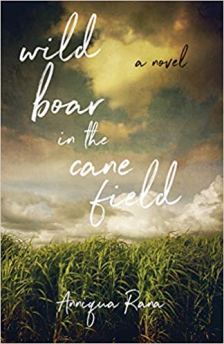
Title: Wild Boar in the Cane Field
Author’s Name: Anniqua Rana
Publisher: Amazon, 2019
‘My mothers found me a week after I was born.’
And so, begins the poignant story of Tara’s birth, her survival and her death. Anniqua Rana’s Wild Boar in the Cane Field is a testimony to the old adage — survival of the fittest. Her observations of life of women in rural Pakistan combined with her knack of storytelling, ensures a reader is left enthralled.
Anniqua Rana lives in California with her husband and two sons. Apart from teaching English to immigrants and international students in community college, she also writes essays on gender and education.
Rana’s novel, Wild Boar in the Cane Field, journeys rural Pakistan where amidst the cane fields and smell of spices, we are introduced to Tara and her mothers. The prose is evocative and lyrical with descriptions that come alive in every passage.
“I hurriedly finished the verse, not sure that I had the strength to continue my pursuit of finding my way into a world designated for men.”
The story starts with the birth of Tara and takes us through the journey of her growing up. It can easily be called a coming of age story set in rural Pakistan with its flavors and fragrances intact. Rana has a drawn extremely powerful images with her engrossing narrative and presented a beautifully layered story with characters that tease your memory. Though the setting is in Pakistan with plenty of of local references in terms of culture and tradition, it would not be wrong to say this story could easily have been a part of any South Asian sub-continental village and still remain so connectable. The patriarchal system has dictated female lives for centuries and this story is an honest depiction of what all a woman goes through in such a misogynistic society.
Read the full review on Kitaab.